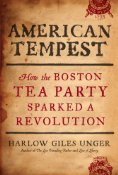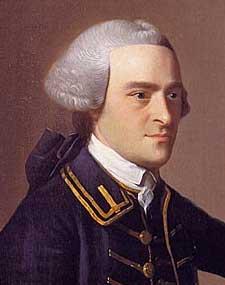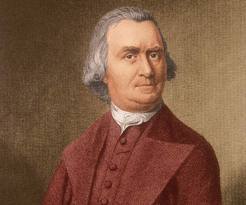
American Tempest: How The Boston Tea Party Sparked A Revolution by Harlow Giles Unger
 Harlow Giles Unger has written another fascinating book. American Tempest, How The Boston Tea Party Sparked A Revolution is his latest in a series of really good biographies. While it is true that American Tempest is not a biography in the sense that Patrick Henry, Lion of Liberty and James Monroe, The Last Founding Father are, it is a biography of sorts – of  the first Tea Party Patriots. American Tempest might have been written about  John Hancock and Samuel Adams, given the volume of interesting information about these enigmatic patriots.
Harlow Giles Unger has written another fascinating book. American Tempest, How The Boston Tea Party Sparked A Revolution is his latest in a series of really good biographies. While it is true that American Tempest is not a biography in the sense that Patrick Henry, Lion of Liberty and James Monroe, The Last Founding Father are, it is a biography of sorts – of  the first Tea Party Patriots. American Tempest might have been written about  John Hancock and Samuel Adams, given the volume of interesting information about these enigmatic patriots.
The picture of Samuel Adams that emerges from American Tempest is considerably less flattering than that drawn by Ira Stoll, whose biography of Adams was one of the first reviewed at WWTFT. Re-reading that review, it becomes obvious that it is difficult to come up with a true picture of any biographer’s subject based on one book, regardless how good it may be. It would be interesting to hear a debate between between these two authors, both of whom wrote interesting and informative books.
In the Stoll biography, Adams is portrayed with an emphasis on the results of his actions, a willingness to believe his protestations of innocence, and perhaps a tinge of hero worship. The view from American Tempest delves a bit deeper into Adam’s darker side. The authors are much closer in their respective portrayals of John Hancock. While Unger pulls no punches in his depiction of Hancock as a bit of an opportunist, he also gives him his due as a true patriot. Ironically, in Stoll’s book Hancock’s faults are emphasized almost to the exclusion of his accomplishments.
 John Hancock was a wealthy merchant who alternately funded and distanced himself from the rabble that Adams mustered in Boston. Initially, Hancock wanted to hedge his bets. He tried to remain in both the patriot and loyalist camps simultaneously but was ultimately drawn  solidly into the rebel camp by the machinations of Samuel Adams. However, although for a time Adams used the wealthy Hancock as his “milch cow” for funding many of his activities and underwriting his living expenses, he got more than he bargained for when he roped Hancock in once and for all. Hancock assumed leadership of the rebels and turned them into patriots, leaving Adams far behind in influence and power.
John Hancock was a wealthy merchant who alternately funded and distanced himself from the rabble that Adams mustered in Boston. Initially, Hancock wanted to hedge his bets. He tried to remain in both the patriot and loyalist camps simultaneously but was ultimately drawn  solidly into the rebel camp by the machinations of Samuel Adams. However, although for a time Adams used the wealthy Hancock as his “milch cow” for funding many of his activities and underwriting his living expenses, he got more than he bargained for when he roped Hancock in once and for all. Hancock assumed leadership of the rebels and turned them into patriots, leaving Adams far behind in influence and power.
Once Hancock was in, he was in wholeheartedly. Hancock had remained in Boston for the First Continental Congress, but acceded to demands that he attend the Second Continental Congress. Unger points out:
... Hancock, more than anyone else there, had made enormous sacrifices for the Patriot cause and deserved public acclaim. He had lost his sloop Liberty, spent at least £100,000 of his own money on arms and ammunition, and risked the rest of his fortune on the success of the revolution. If arrested on the king’s warrant, he faced trial on charges of treason, with the possible loss of both his honor and his life.
It was Adams, on the other hand, perhaps more than anyone else in Boston, who lit the flame of revolution. He was a magician with propaganda and publicity and used Hancock’s money to build relationships with the disenfranchised. Unger offers this sketch of Adams and his activities with James Otis Jr. another Tea Party Patriot:
Sam Adams’s parents died in 1758, and although young Sam — by then thirty-six — inherited the brewery and the family’s fine home on Purchase Street, he ran the brewery into bankruptcy and allowed the house to deteriorate. Evidently unconcerned with earning money, he married, fathered two children, and, after his wife’s death, raised his children in abject poverty. Friends of his father found him a sinecure as a city tax collector to ensure his earning enough to feed his children and his slave, but within a short time, his ledgers showed a shortage of £8,000, representing tax monies he had either failed to collect or had embezzled.
Initially repelled by Adams’s person, Otis only embraced his fellow Harvard alumnus after discovering Adams’s skilled pen and his connections with a huge, disenfranchised and underpaid population of shipfitters, rope makers, sail makers, caulkers, sailors, clerks and longshoremen who worked Boston’s waterfront. The waterfront workers would soon prove a natural and powerful constituency as foot soldiers for Sam Adams’s political movement. Although Adams abstained from alcohol, he spent evenings roaming the city’s taverns, where, according to his distant cousin John Adams, patrons “smoke tobacco till you cannot see from one to the other. They they drip flip1 I suppose, and there they choose … selectmen, assessors, collectors, wardens, fire-wardens, an representatives.” Sam Adams patrolled the taverns to make certain that they chose the men he wanted them to choose and ensure his own ambitions for political power.
 As Unger takes the reader through the events leading up to the actual “Tea Party” in Boston Harbor he paints a picture of a somewhat spoiled populace, who perhaps, had they been able to see things from a larger perspective, might have realized  their good fortune in living in America, where they enjoyed a standard of living and freedoms unknown to most Englishmen. The back story on Samuel Adams and James Otis is one of jealousy and grudges against the establishment for perceived and real slights to their families and reputations.  According to Unger, these men were at least partially motivated by personal grudges against the establishment.
As Unger takes the reader through the events leading up to the actual “Tea Party” in Boston Harbor he paints a picture of a somewhat spoiled populace, who perhaps, had they been able to see things from a larger perspective, might have realized  their good fortune in living in America, where they enjoyed a standard of living and freedoms unknown to most Englishmen. The back story on Samuel Adams and James Otis is one of jealousy and grudges against the establishment for perceived and real slights to their families and reputations.  According to Unger, these men were at least partially motivated by personal grudges against the establishment.
On the other hand, Unger points out the stupidity of the British actions which fomented some minor squabbles in one colony into a full-scale rebellion in all the colonies. By painting with too broad a brush, the British ended up uniting the colonies against the mother country.
American Tempest chronicles the rise and decline of the Tea Party Patriots in Boston. It was Hancock who transformed the mob into patriots by eschewing and denouncing the violence.  The change is an interesting one, because it ensured their demise as a political force. Hancock instilled discipline and order — things antithetical to a mob, and in so doing severely undermined the influence wielded by Sam Adams.  While the latter faded from prominence during the revolution, Hancock became the country’s first president of the United States – under the Articles of Confederation.
As with any book of consequence, it is difficult to write a review for fear of  leaving something critical out. American Tempest certainly qualifies as a book of consequence. It is informative and thought provoking, packed with historical footnotes and research. Unger points out in the introduction that: “Ironically, few, if any, Americans today — even those who call themselves Tea Party Patriots — know the true and entire story of the original Tea Party and Patriots who staged it.” He’s right, and while this review does little to correct that, reading his book will.
1A mixture of beer and spirit sweetened with sugar and heated with a hot iron. — The Shorter Oxford Dictionary.
 The posts are coming!
The posts are coming!


3 comments
Saw the book-tv presentation by Unger. I got the impression he thinks we were all wrong about the Brits. Well – one gets a very different impression of their legitimacy after watching the ‘Secrets of the Dead’ episode on the Bible. Unger says British Rule was legitimate. I suspect that the antics of King Henry VIII proved otherwise, not to mention King James and Archbishop Laud. I don’t remember Unger saying much about the development of Self Government – thanks mostly to New Englanders having to get their act together during the English Civil War, which established de-facto independence. That pretty much spelled the end of assuming the legitimacy of the Crown. I also did not hear, in that talk, anything about the role of free masons.
[Reply]
I listened to his presentation on CSPAN promoting this book. I found a number of his comments rather strange and unorthodox, portraying a picture rather different from that of other historians. He left the impression that the colonists illegally rebelled from the legitimate authority of the English Crown in pursuit of some kind of states rights libertarianism, a correct argument if you represented the English King. And if they had been left to their own devices, before Sam Adams and a bunch of waterfront thugs had stirred them up, would have remained good citizens of the British Empire. I would like to hear a discussion between himself and another historian with a different view, I am sure it would be lively!
[Reply]
Martin Reply:
December 17th, 2012 at 3:08 pm
It’s always difficult, if not impossible to distill the historical reasons for events down to one thing. Adams was definitely a rabble rouse and enjoyed a love-hate relationship with Hancock. To hear Unger tell it, Adams forced the issue and dragged Hancock and other wealthy merchants into a situation where they had to put up, or shut up. However, Unger’s take is not unique and I have heard it from other historians as well.
[Reply]
Leave a Comment